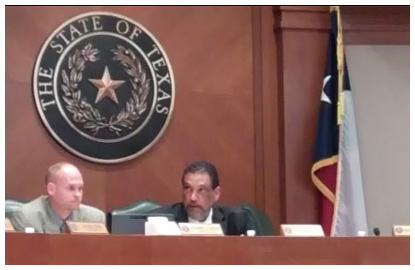 Last week the Texas House of Representatives Committee on Business & Industry heard testimony in Austin relating to House Bill 2989 which would establish the Workplace Fraud Prevention Act (WFPA) in Texas. The bill speaks directly to the construction industry and attempts to define what an employee in the construction industry is in order to curtail the rampant misclassification of employees as independent contractors in the state.
Last week the Texas House of Representatives Committee on Business & Industry heard testimony in Austin relating to House Bill 2989 which would establish the Workplace Fraud Prevention Act (WFPA) in Texas. The bill speaks directly to the construction industry and attempts to define what an employee in the construction industry is in order to curtail the rampant misclassification of employees as independent contractors in the state.
State Representative Joseph Deshotel, who chairs the committee, is sponsoring the bill, and introduced it that day before the committee. He explained:
“This bill is designed to do two things: to properly classify employees as employees and not independent contractors, where as [when classified as] independent contractors they’re not paying unemployment taxes or federal income taxes, and it also would help the public fund here in Texas.”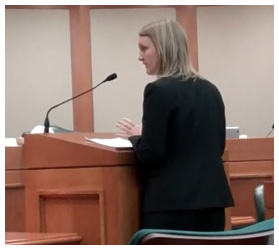
Emily Timm, policy analyst for the Workers Defense Project (WDP), testified first in support of the bill. She explained that WDP assists low-wage workers to recover wages when they are illegally denied payment, and that 80% of the cases that they receive come from the construction industry. Timm also stated:
“Employers frequently misclassify their employees in order to exclude them from their workers compensation policy and thus lower their operating costs. ... The millions of dollars lost to Texas each year due to misclassification in the construction industry, and the burden placed on public safety nets because of this, is simply more than we can afford as a state.”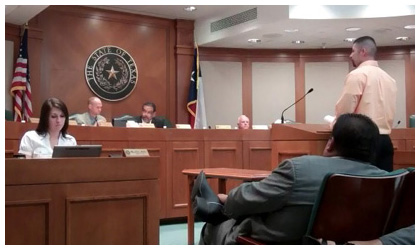 Next to testify was Saul Vela, a former construction worker who worked for a concrete sub-contractor for over a year, but was put into such a financial hole due to being misclassified as an independent contractor and denied regular wages and overtime earned that he had to leave the construction industry to support his family. He was in favor of the bill because he believes that employers should be held accountable, and that this bill would help ensure that construction employers treat their workers fairly.
Next to testify was Saul Vela, a former construction worker who worked for a concrete sub-contractor for over a year, but was put into such a financial hole due to being misclassified as an independent contractor and denied regular wages and overtime earned that he had to leave the construction industry to support his family. He was in favor of the bill because he believes that employers should be held accountable, and that this bill would help ensure that construction employers treat their workers fairly.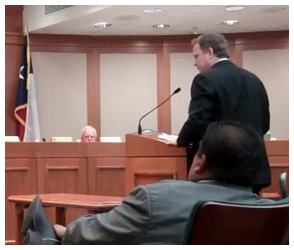 Allen Grainey spoke for the bill on behalf of the Southeast Texas Chapter of the National Electrical Contractors Association (NECA). He testified that the misclassification of employees by some contractors directly impacts employers who play by the rules by diminishing their ability to be competitive. He also reiterated that when misclassification occurs, workers remain unidentified and unprotected and the state loses needed payroll tax revenue. He stated that this piece of legislation would go a long way toward recognizing the major problem of misclassification of employees.
Allen Grainey spoke for the bill on behalf of the Southeast Texas Chapter of the National Electrical Contractors Association (NECA). He testified that the misclassification of employees by some contractors directly impacts employers who play by the rules by diminishing their ability to be competitive. He also reiterated that when misclassification occurs, workers remain unidentified and unprotected and the state loses needed payroll tax revenue. He stated that this piece of legislation would go a long way toward recognizing the major problem of misclassification of employees.
Matthew Capece spoke on behalf of the United Brotherhood of Carpenters and also the Texas Carpenters & Millwrights Regional Council. He stated that he has been working on the 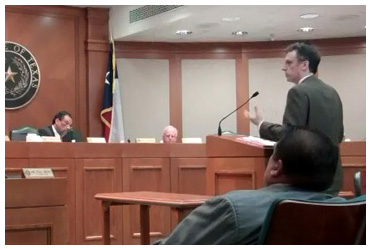 problem of payroll fraud in the construction industry for over 20 years, saying that it is a serious problem not only in Texas but across the United States. Capece said that payroll fraud typically occurs in two ways: employee misclassification and the even more pervasive practice of paying workers “off the books” by either check or cash with no reporting or tax payments. Recently Capece had spoken with a carpenter who was working on a large project in the area who said that his employer had not taken any tax or identification information from him. The employer only knew the worker’s name and cell phone number. He was told that he would be paid in cash, but actually was not paid at all. The worker had heard the employer talk about upcoming jobs the employer was scheduled to work on including jobs at Fort Hood, the large US Army post near Killeen, Texas and on a school construction project. This example shows that payroll fraud occurs on large and government funded projects and not just on small, private jobs.
problem of payroll fraud in the construction industry for over 20 years, saying that it is a serious problem not only in Texas but across the United States. Capece said that payroll fraud typically occurs in two ways: employee misclassification and the even more pervasive practice of paying workers “off the books” by either check or cash with no reporting or tax payments. Recently Capece had spoken with a carpenter who was working on a large project in the area who said that his employer had not taken any tax or identification information from him. The employer only knew the worker’s name and cell phone number. He was told that he would be paid in cash, but actually was not paid at all. The worker had heard the employer talk about upcoming jobs the employer was scheduled to work on including jobs at Fort Hood, the large US Army post near Killeen, Texas and on a school construction project. This example shows that payroll fraud occurs on large and government funded projects and not just on small, private jobs.
Capece concluded his testimony saying that he believes the WFPA legislation would be beneficial for the Texas construction industry. He stated:
“This is a nationwide problem. Thirty-two states have addressed it in one fashion or another, and I want to let you know that the language you have in front of you fits well within the community of 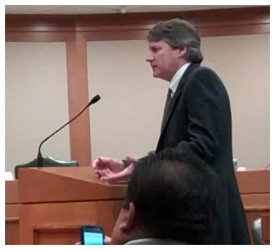 legislation that has been seen around the country in order to address this problem. We hope you will support this legislation.”
legislation that has been seen around the country in order to address this problem. We hope you will support this legislation.”
The final person who testified for the bill that day was Brendan Doyle, Division President of Marek Brothers Systems in Austin. Some of his remarks were:
“If you pass this bill into law, you will begin to change the face of the construction industry in Texas, help create a sustainable construction workforce and help provide a safer working environment for the construction workers of Texas. Additionally, you will provide to those of your constituents in the industry, a brighter future as construction workers and a better life for their families.”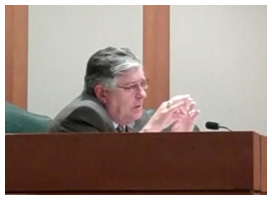
Several other names were read who registered as “for the bill but do not wish to testify” including representatives from the Mechanical Contractors Association of Texas and the Texas Construction Association. Only two people registered as being against the bill, and neither of those testified or listed an affiliation.
Following many of the testimonies, Representative Paul Workman asked follow-up questions as he sought to determine if the bill’s wording would effectively address the problems discussed.
After everyone who wished to testify on the bill had done so, the committee did not vote, and Chairman Deshotel stated that the bill would remain pending at this time.
Texas Legislators Consider Workplace Fraud Prevention Act
by Elizabeth McPherson | April 05, 2011



Comments
HB 2989 passed out of committee
The House of Representatives Committee on Business & Industry reported favorably on this bill today (April 6, 2011).
Add new comment